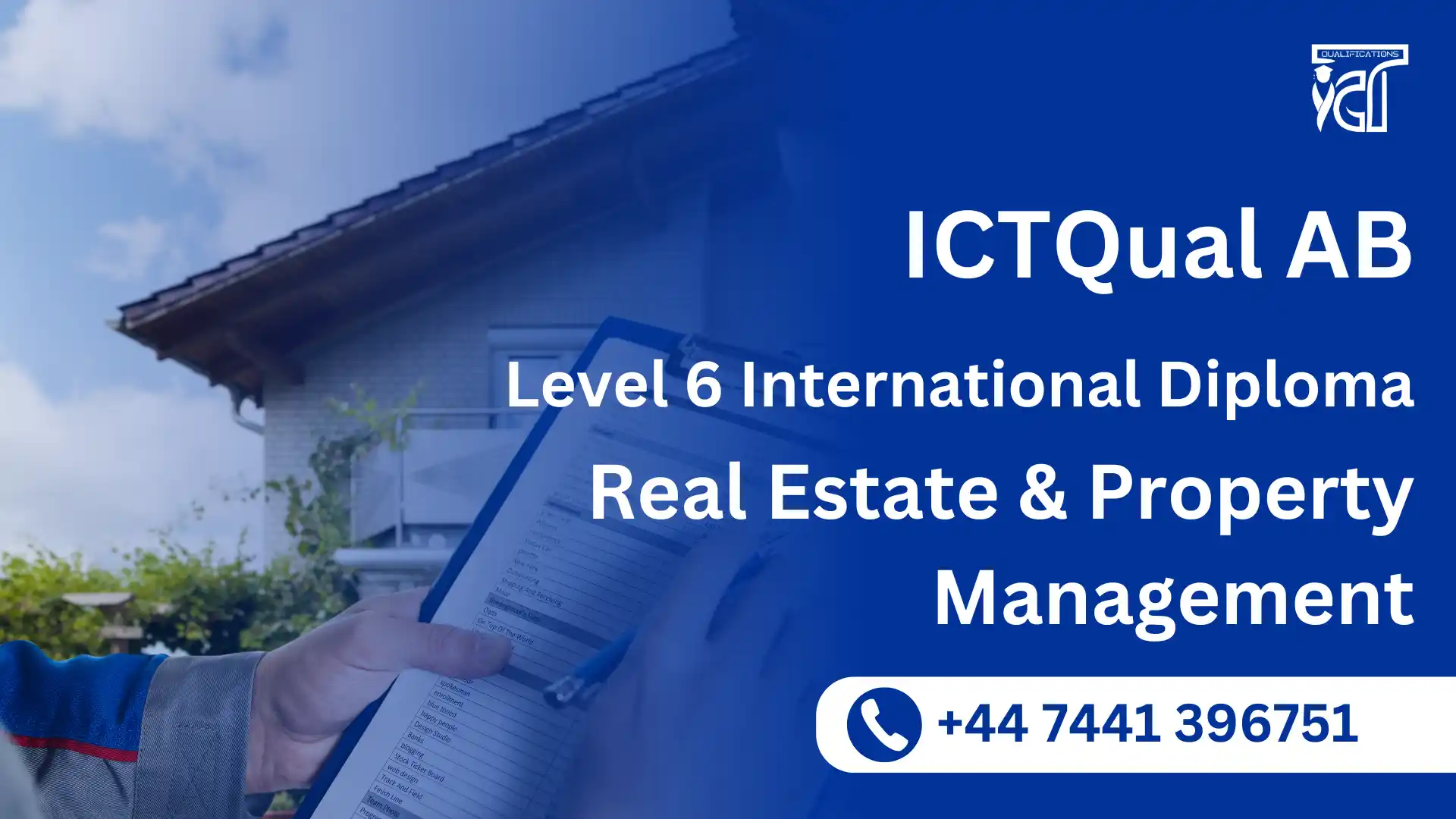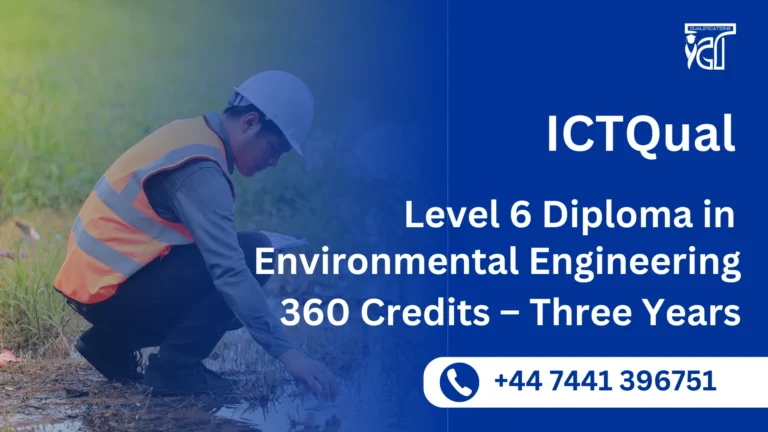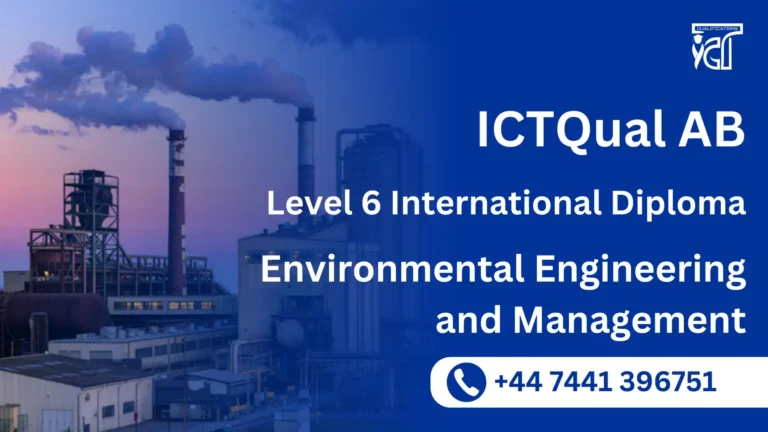The ICTQual AB Level 6 International Diploma in Real Estate & Property Management is a prestigious qualification tailored for learners who aspire to excel in the fast-growing global real estate and property management industry. Whether you are a fresher eager to enter this dynamic field or a seasoned professional looking to formalise and enhance your expertise, this programme delivers a balanced mix of practical knowledge and strategic insight to shape future industry leaders.
This comprehensive three-year programme with a 360-credit structure equips learners with advanced skills in property valuation, investment analysis, asset management, leasing strategies, and sustainable development. It reflects current industry trends, preparing learners to manage both residential and commercial portfolios effectively, implement smart property technologies, and navigate complex legal and financial frameworks confidently.
Graduates of this diploma gain the professional value needed to thrive in competitive markets worldwide. Learners will build capabilities in stakeholder communication, negotiation, and decision-making, ensuring they are prepared for leadership roles in real estate agencies, property management firms, development companies, or entrepreneurial ventures.
Completing this diploma opens doors to exciting career opportunities, including Property Manager, Real Estate Analyst, Asset Manager, Facilities Manager, or Investment Consultant. By combining academic rigour with practical industry applications, this programme positions learners for long-term career success, global recognition, and leadership within the real estate and property management sectors. Designed for international relevance and local application, it ensures learners are equipped to meet the evolving demands of the property industry and drive sustainable, profitable growth.
ICTQual AB Level 6 International Diploma in Real Estate & Property Management
This qualification, the ICTQual AB Level 6 International Diploma in Real Estate & Property Management, consists of 36 mandatory units.
Year 1 – Foundation in Real Estate & Property Management
- Principles of Real Estate and Property Management
- Introduction to Property Development Projects
- Construction Materials and Methods in Property
- Property Valuation Fundamentals
- Project Planning and Scheduling in Property Management
- Health, Safety, and Environmental Awareness in Property
- Communication and Stakeholder Management in Real Estate
- Digital Tools and Property Management Systems
- Financial Management in Property Projects
- Quality Assurance and Control in Property Management
- Legal and Regulatory Frameworks in Real Estate
- Professional Ethics and Conduct in Property Management
Year 2 – Intermediate Real Estate & Property Management Practices
- Advanced Property Valuation Techniques
- Resource Management and Allocation in Property Projects
- Project Cost Estimation and Budgeting in Real Estate
- Lease Administration and Contract Management
- Procurement and Supply Chain Management in Property
- Risk Analysis and Mitigation in Property Management
- Leadership and Team Management in Property Projects
- Facilities and Site Management
- Sustainable Development and Environmental Management in Real Estate
- Project Monitoring and Reporting in Property Management
- Problem-Solving and Decision-Making in Real Estate Projects
- Communication and Negotiation Skills in Property Management
Year 3 – Advanced Real Estate & Strategic Leadership
- Strategic Property Management and Investment
- Advanced Infrastructure and Property Planning
- Real Estate Portfolio Management
- Innovation and Emerging Technologies in Property
- Advanced Risk and Crisis Management in Property Projects
- Contract Management and Legal Compliance in Real Estate
- Leadership in Real Estate Projects
- Advanced Project Control and Performance Measurement
- Project Governance and Compliance in Property Management
- Research Methods and Project Analysis in Real Estate
- Capstone Project in Real Estate & Property Management
- Professional Development and Career Planning
Learning Outcomes for the ICTQual AB Level 6 International Diploma in Real Estate & Property Management:
Year 1 – Foundation in Real Estate & Property Management
Principles of Real Estate and Property Management
- Understand fundamental concepts of Real Estate & Property Management practices.
- Analyse property types, investment options, and market dynamics.
- Explore property lifecycle management, including acquisition, utilisation, and disposal.
- Apply basic management principles to residential, commercial, and industrial properties.
Introduction to Property Development Projects
- Identify the stages of property development from feasibility to completion.
- Understand stakeholder roles, responsibilities, and collaboration in property projects.
- Assess project objectives, constraints, and resource requirements.
- Develop preliminary project proposals and conceptual plans.
Construction Materials and Methods in Property
- Describe common construction materials and their properties for residential and commercial projects.
- Understand standard construction techniques and building methods.
- Evaluate material suitability for durability, sustainability, and cost efficiency.
- Apply knowledge of construction methods to project planning and execution.
Property Valuation Fundamentals
- Understand key principles and approaches to property valuation.
- Conduct basic market research and data collection for property appraisal.
- Analyse factors affecting property value, such as location, condition, and market trends.
- Prepare preliminary valuation reports for different property types.
Project Planning and Scheduling in Property Management
- Develop project plans with timelines, milestones, and resource allocation.
- Use scheduling tools to sequence tasks effectively.
- Identify dependencies, critical paths, and potential delays.
- Adjust plans to meet project objectives and deadlines.
Health, Safety, and Environmental Awareness in Property
- Demonstrate knowledge of health, safety, and environmental regulations in property projects.
- Apply safe practices on site inspections and property management activities.
- Conduct preliminary environmental assessments for property developments.
- Promote sustainability and safety in property management decisions.
Communication and Stakeholder Management in Real Estate
- Identify key stakeholders and their expectations in property projects.
- Communicate effectively using written, verbal, and visual methods.
- Manage stakeholder feedback and maintain positive relationships.
- Resolve minor conflicts to support project objectives.
Digital Tools and Property Management Systems
- Understand digital tools and software used in property management.
- Apply property management systems for tracking, reporting, and analysis.
- Use technology to enhance efficiency and accuracy in property operations.
- Explore emerging digital solutions for real estate management.
Financial Management in Property Projects
- Interpret financial statements, budgets, and cash flow reports.
- Apply cost management principles to property projects.
- Monitor project expenditures and identify variances.
- Support financial decision-making in investment and operational planning.
Quality Assurance and Control in Property Management
- Understand quality management concepts and standards for property projects.
- Implement quality control measures to meet project specifications.
- Monitor compliance with design and regulatory requirements.
- Recommend improvements to enhance project quality.
Legal and Regulatory Frameworks in Real Estate
- Understand laws, regulations, and statutory requirements affecting property management.
- Apply compliance measures to property transactions and development projects.
- Identify potential legal risks and mitigation strategies.
- Evaluate the impact of regulations on property project outcomes.
Professional Ethics and Conduct in Property Management
- Recognise professional ethical standards in real estate and property management.
- Apply ethical decision-making in project scenarios.
- Promote transparency, accountability, and integrity in property operations.
- Understand responsibilities to clients, communities, and colleagues.
Year 2 – Intermediate Real Estate & Property Management Practices
Advanced Property Valuation Techniques
- Conduct detailed property appraisals using advanced methodologies.
- Analyse market trends, comparables, and investment potential.
- Prepare comprehensive valuation reports for commercial and residential properties.
- Apply valuation knowledge to support strategic investment decisions.
Resource Management and Allocation in Property Projects
- Manage human, material, and financial resources efficiently.
- Analyse and allocate resources for property development and management projects.
- Monitor utilisation and productivity across teams.
- Adjust resource plans to meet project objectives and deadlines.
Project Cost Estimation and Budgeting in Real Estate
- Prepare detailed cost estimates for property projects.
- Monitor and control project budgets and expenditures.
- Conduct cost-benefit analysis to support investment decisions.
- Identify financial risks and implement mitigation strategies.
Lease Administration and Contract Management
- Understand lease agreements, tenant management, and contractual obligations.
- Administer contracts in line with legal and regulatory standards.
- Monitor compliance and enforce contract terms effectively.
- Resolve disputes professionally while maintaining stakeholder relationships.
Procurement and Supply Chain Management in Property
- Plan procurement processes and select suppliers effectively.
- Manage contracts and optimise supply chains for property projects.
- Monitor supplier performance and ensure timely delivery of materials or services.
- Align procurement strategies with project budgets and schedules.
Risk Analysis and Mitigation in Property Management
- Conduct comprehensive risk assessments for property projects.
- Develop and implement mitigation strategies for operational and investment risks.
- Monitor risks and evaluate effectiveness of strategies.
- Adjust plans to minimise financial, operational, or regulatory impacts.
Leadership and Team Management in Property Projects
- Demonstrate leadership skills in multidisciplinary property teams.
- Manage team dynamics and resolve conflicts effectively.
- Motivate and guide team members to achieve objectives.
- Foster collaboration, accountability, and high-quality outcomes.
Facilities and Site Management
- Plan and supervise facilities and property site operations.
- Ensure compliance with safety, quality, and environmental standards.
- Coordinate maintenance, repairs, and operational activities.
- Monitor daily operations and report progress to stakeholders.
Sustainable Development and Environmental Management in Real Estate
- Apply sustainable practices in property development and management.
- Evaluate environmental impacts of real estate projects.
- Integrate energy efficiency, green technologies, and resilience strategies.
- Promote sustainable practices in decision-making and portfolio management.
Project Monitoring and Reporting in Property Management
- Track project progress against objectives, timelines, and budgets.
- Prepare professional progress reports for clients and stakeholders.
- Analyse performance data to identify issues or delays.
- Recommend corrective actions to maintain project alignment.
Problem-Solving and Decision-Making in Real Estate Projects
- Apply analytical techniques to resolve property management challenges.
- Make informed decisions using financial, operational, and market data.
- Evaluate alternative solutions for feasibility and impact.
- Document decisions and outcomes to support accountability.
Communication and Negotiation Skills in Property Management
- Demonstrate effective written, verbal, and visual communication.
- Apply negotiation strategies with clients, tenants, contractors, and suppliers.
- Facilitate stakeholder collaboration and consensus-building.
- Resolve conflicts and achieve mutually beneficial outcomes.
Year 3 – Advanced Real Estate & Strategic Leadership
Strategic Property Management and Investment
- Develop long-term strategies for property portfolios and investments.
- Align portfolio objectives with organisational and market goals.
- Analyse financial, operational, and market data for strategic decisions.
- Apply risk assessment and optimisation techniques to maximise returns.
Advanced Infrastructure and Property Planning
- Lead planning for complex infrastructure and property projects.
- Integrate technical, financial, and regulatory considerations.
- Coordinate multidisciplinary teams for project delivery.
- Optimise project workflows using planning and digital tools.
Real Estate Portfolio Management
- Manage diversified property portfolios effectively.
- Analyse asset performance, income, and capital growth.
- Implement portfolio optimisation strategies.
- Prepare reports and recommendations for investors and stakeholders.
Innovation and Emerging Technologies in Property
- Identify and apply technological innovations in property management.
- Evaluate property management software, IoT, and smart building systems.
- Promote innovation to improve operational efficiency and tenant experience.
- Assess feasibility and ROI of emerging technologies.
Advanced Risk and Crisis Management in Property Projects
- Conduct high-level risk assessments for complex property projects.
- Develop contingency and mitigation plans for crises.
- Manage unexpected events to maintain continuity and compliance.
- Evaluate risk strategies for continuous improvement.
Contract Management and Legal Compliance in Real Estate
- Administer complex contracts and leases in line with regulations.
- Ensure compliance with statutory and contractual obligations.
- Resolve disputes professionally while protecting organisational interests.
- Apply legal knowledge to minimise risk in property management.
Leadership in Real Estate Projects
- Lead multidisciplinary teams in strategic property projects.
- Mentor, motivate, and develop team members effectively.
- Implement strategies for accountability, collaboration, and high performance.
- Promote ethical and professional conduct in leadership roles.
Advanced Project Control and Performance Measurement
- Monitor and control property projects using advanced techniques and KPIs.
- Analyse performance data to ensure alignment with strategic objectives.
- Implement corrective actions to maintain efficiency and quality.
- Prepare detailed performance reports for stakeholders and investors.
Project Governance and Compliance in Property Management
- Apply governance frameworks to ensure transparency and accountability.
- Ensure adherence to legal, regulatory, and organisational standards.
- Establish monitoring and reporting mechanisms for compliance.
- Review and improve governance practices for property portfolios.
Research Methods and Project Analysis in Real Estate
- Conduct research to support evidence-based Real Estate & Property Management decisions.
- Analyse market trends, financial data, and operational metrics.
- Apply statistical and analytical methods to interpret findings.
- Present research outcomes in professional reports or presentations.
Capstone Project in Real Estate & Property Management
- Integrate knowledge and skills from all course units into a practical project.
- Demonstrate competence in property planning, management, and investment.
- Apply leadership, problem-solving, and strategic decision-making.
- Produce a professional portfolio, report, and presentation of project outcomes.
Professional Development and Career Planning
- Develop a personal career plan aligned with property management and real estate.
- Identify opportunities for professional growth and continuing education.
- Build skills in networking, professional ethics, and strategic thinking.
- Prepare for senior roles in property management, consultancy, or investment.
The ICTQual AB Level 6 International Diploma in Real Estate & Property Management provides learners with advanced knowledge, practical skills, and global insights to thrive in the competitive property market. Whether you are entering the field or seeking to enhance your existing expertise, this programme offers a comprehensive foundation for career growth, professional credibility, and international opportunities.
1. Professional Recognition and Credibility
- Gain a globally respected qualification valued across the real estate and property management sectors.
- Build trust and recognition among employers, clients, and industry peers.
- Strengthen your profile for leadership or senior management positions.
2. Advanced Skills and Industry-Relevant Knowledge
- Master property valuation, investment analysis, and sustainable development strategies.
- Learn to manage diverse portfolios, including residential, commercial, and mixed-use properties.
- Develop negotiation, stakeholder communication, and financial planning expertise.
3. Enhanced Career Opportunities
- Qualify for roles such as Property Manager, Real Estate Analyst, Asset Manager, Facilities Manager, or Investment Consultant.
- Expand your opportunities in real estate agencies, development firms, and multinational property corporations.
- Increase your earning potential and competitiveness in the global job market.
4. Practical and Strategic Learning Experience
- Engage with real-world case studies and assignment-based learning tailored to industry challenges.
- Gain confidence in handling legal, financial, and operational aspects of property management.
- Access guidance from experienced tutors to support your professional growth.
5. Pathway for Long-Term Career Growth
- Use this diploma as a stepping stone toward Level 7 qualifications or postgraduate study.
- Build the expertise needed to start your own real estate consultancy or property management business.
- Stay ahead in a rapidly evolving industry with updated knowledge and strategic insights.
The ICTQual AB Level 6 International Diploma in Real Estate & Property Management is designed for motivated learners aiming to build a successful career in the global property market. It suits both newcomers to the field and experienced professionals who wish to enhance their credentials and leadership skills.
1. Fresh Graduates and Career Starters
- Learners with a background or interest in business, finance, urban planning, or real estate.
- Individuals seeking practical skills and an internationally recognised qualification to launch their property careers.
- Those eager to explore diverse roles such as property consultancy, valuation, or facilities management.
2. Experienced Professionals
- Learners with 6+ years of verifiable experience in real estate, property development, or asset management.
- Professionals aiming to formalise their expertise through a recognised qualification for career advancement.
- Individuals preparing for senior-level roles or transitioning into specialised areas of property management.
3. Aspiring Leaders and Entrepreneurs
- Learners preparing for leadership positions within real estate agencies, investment firms, or development companies.
- Those with ambitions to establish their own real estate consultancy or property management business.
- Professionals interested in strengthening negotiation, decision-making, and portfolio management skills.
4. Globally Focused Learners
- Learners targeting international markets and opportunities in the rapidly evolving property sector.
- Individuals seeking adaptable skills relevant to local and global property trends.
- Those committed to completing a three-year, 360-credit programme to achieve long-term career success and recognition.
Completing the ICTQual AB Level 6 International Diploma in Real Estate & Property Management positions learners for advanced study, professional certifications, and exciting career opportunities worldwide. This qualification provides a strong foundation for long-term growth in one of the most dynamic and profitable industries.
1. Academic Advancement
- Progress to Level 7 Diplomas or equivalent postgraduate programmes in real estate, property development, or business management.
- Pursue a Master’s degree (MSc, MBA, or related field) to deepen expertise in investment strategies, property law, or urban development.
- Specialise further through advanced study in areas such as commercial property, real estate finance, or sustainable development.
2. Professional Career Growth
- Qualify for senior positions like Property Manager, Real Estate Analyst, Asset Manager, Facilities Director, or Investment Consultant.
- Expand opportunities in multinational corporations, real estate development firms, or property investment companies.
- Increase earning potential and access leadership roles in competitive markets.
3. Industry Certifications and Memberships
- Strengthen your professional profile by pursuing memberships in recognised real estate or property management associations.
- Use this diploma as a stepping stone for certifications that enhance credibility and employability in global markets.
4. Entrepreneurial and Consultancy Opportunities
- Launch your own real estate consultancy or property management firm.
- Offer advisory and portfolio management services to investors, developers, and property owners.
This diploma ensures learners have the expertise, recognition, and confidence to succeed at the highest levels of the real estate and property management industry.
As an approved centre of ICTQual AB, we proudly deliver and assess the Level 6 International Diploma in Real Estate & Property Management. Learners must enrol with us to gain access to official study materials, expert tutor support, and globally recognised certification. Two distinct certification routes are available to suit different learner profiles:
Route 1 – Experienced Professionals
This route is tailored for learners with a minimum of six (6) years of verifiable experience in real estate, property management, or related industries.
- Evidence of Experience: Learners must submit employer references, project portfolios, or formal verification letters confirming their professional background.
- Assessment Method: Recognition of Prior Learning (RPL) and competency-based evaluation validate existing knowledge and expertise.
- Fast-Track Certification: This option allows experienced professionals to achieve the diploma without completing all coursework.
- Best Suited For: Senior property managers, investment consultants, real estate analysts, and other professionals seeking formal recognition of their skills.
Route 2 – Fresh Candidates / New Entrants
This route is designed for learners who are new to the real estate and property management industry.
- Assignments Requirement: Fresh learners are required to complete 36 structured assignments covering all diploma study units.
- Comprehensive Learning: Assignments include real-world case studies, analytical tasks, and scenario-based projects to ensure in-depth knowledge.
- Tutor Support: Learners receive personalised guidance and feedback to help them succeed throughout the programme.
- Best Suited For: Recent graduates, junior property professionals, or individuals transitioning into real estate and property management careers.
By enrolling with us, learners ensure they receive authentic ICTQual AB certification, equipping them with the advanced skills and credibility required to excel in the competitive global property market.
Entry Requirements
To enrol in the ICTQual AB Level 6 International Diploma in Urban Planning & Smart Cities, learners must meet the following requirements to ensure they are prepared for this advanced programme:
1. Minimum Age
- Learners must be at least 18 years old at the time of enrolment.
2. Educational Background
- Learners should hold a Level 5 qualification or equivalent in real estate, property management, business, finance, or a related field.Those with substantial professional experience in property management or real estate may also be considered.
3. Professional Experience
- Experienced Professionals Route: At least 6 years of verifiable work experience in real estate, property management, or asset management.
- Freshers Route: No prior experience is required but learners must complete 36 structured assignments to achieve certification.
4. Language Proficiency
- Learners must have proficiency in English to complete assignments and assessments effectively.
- Non-native speakers are recommended to provide evidence of language ability (e.g., IELTS 5.5 or equivalent) or successfully complete an internal language assessment.
Register Now
Qualification Process
Qualification Process for the ICTQual AB Level 6 International Diploma in Real Estate & Property Management
- Self-Assessment:
Begin by evaluating your eligibility to ensure you meet the qualification requirements, including work experience, knowledge, and language proficiency. - Registration:
Complete your registration by submitting the required documents, including a scanned copy of a valid ID, and paying the registration fee. - Induction:
An assessor will conduct an induction to confirm your eligibility for the course and explain the evidence requirements. If you do not meet the criteria, your registration will be cancelled, and the fee will be refunded. - Assignments & Evidence Submission:
Provide all assignments and the necessary evidence based on the assessment criteria outlined in the course. If you are unsure of the required evidence, consult with the assessor for guidance on the type and nature of evidence needed. - Feedback and Revision:
The assessor will review your submitted evidence and provide feedback. Evidence that meets the criteria will be marked as “Criteria Met,” while any gaps will be identified. You will be asked to revise and resubmit if needed. - Competence Evidence:
Submit final evidence demonstrating that all learning outcomes have been met. This evidence will be marked as “Criteria Met” by the assessor once it is satisfactory. - Internal Quality Assurance (IQA):
The Internal Quality Assurance Verifier (IQA) will review your evidence to ensure consistency, quality, and compliance with standards. - External Verification:
The IQA will submit your portfolio to ICTQUAL AB External Quality Assurance Verifiers (EQA) for final confirmation. The EQA may contact you directly to verify the authenticity of your evidence. - Certification:
Upon successful completion of all checks, ICTQUAL AB will issue your official certificate, confirming that you have attained the ICTQual AB Level 6 International Diploma in Real Estate & Property Management.







